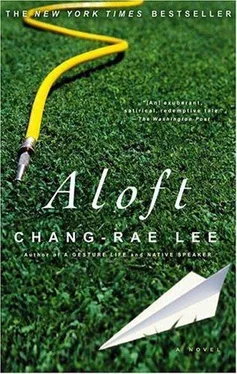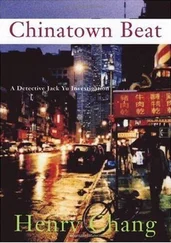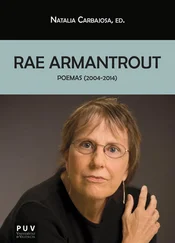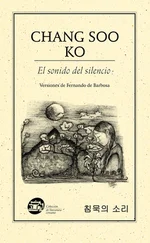"I fixed the house," she said, her voice husky, dried-out.
"Yeah," I said, just like I might to the guys, as though it was simply what I expected. It's always best, when you're trying to get things done, to utter the absolute minimum. You made it rain? Okay. You moved Heaven and Earth? Fine. This, too, was part of my general studies education a la Pop; he's the one who showed me how effective it can be to say grindingly little at the very moments you ought to say a lot, when you could easily be sappy and effusive and overgenerous with praise or forgiveness, when you could tender all you had and no one would ask for anything extra in return.
I know. I know about this. I do.
So when Daisy went on to say, "The other stuff, too. I got rid of it all. I did what you want, Jerry," what did I say back but simply, "Right," with a slight tip of the noggin, with a tough-guy grunt, which you'd think would be just what Daisy had had to deal with all her inscrutable Oriental/Asian life, and probably had, and was part of the reason she'd ended up with someone like me, some average American Guido she'd figure would have more than plenty to say, entreating every second with his hands and his hips and with his heart blithering on his sleeve.
Daisy didn't say anything and neither did I and for a moment our normally cramped en suite bath got very large in feeling, the only sound coming from the running toilet tank, this wasteful ever-wash I've always meant to fix but never actually have, even to this day. Daisy got up then and brushed past me and I could hear her walk out of our bedroom and down the hallway to the kitchen. I showered and changed and when I got to the table the kids were already eating their dinner, as usual furiously wolfing their food like a pair of street urchins who'd stolen into a cake shop. Daisy was making up my plate. As little kids, Jack and Theresa were forever hungry, a trait only parents must know to be peerlessly endearing, and the only time I can remember them not eating was after Daisy was buried and we had a gathering at the house, the two of them sitting glumly on the sofa, a plate of cold shrimp and capicola balanced between them on their legs.
Daisy set down my dinner and she sat, too, but wasn't eating.
After serving all of us seconds she took our plates and began cleaning up. The kids chattered back and forth but Daisy and I didn't say a word to each other. In the morning, breakfast was the same, and it was like that for the rest of that week and the next. Finally I got tired of the whole thing and when he asked I told Pop his method was fine save for the rageful misery and silences. He told me to keep it in my pants a bit longer, that I'd break her and also break myself of "the need to please her all the time," and that he and Nonna would stop by on Saturday to run interference. I asked him to just come over and play with the kids, so I could patch things up with Daisy, maybe take a drive to Robert Moses and sit on the grassy dunes and tell/beg her that I wished for our life to be normal again, though in truth their visit would mean that Nonna would take the kids out to the playground or to a matinee and then somehow cobble together a gut-busting dinner of meatballs and sausages and pasta and a roast, with Pop haranguing me about the state of our business and then inevitably bringing up Bobby, which he did anytime we spent more than an hour together.
When my folks arrived Daisy was still in the bedroom getting dressed. No matter her state of mind or what was going on she always pulled herself together for them, and particularly for Pop.
She'd wear her newest outfits and full evening makeup and jewelry and maybe she'd tie a little rolled silk scarf around her neck, which gave her a fetchingly game barmaid look. Pop of course lapped it up. He loved how she made silly mistakes with her English and always laughed at his jokes and patiently listened to all his stories and theories and opinions about the brutality of man and falsity of religion and the conspiring forces of a New World Order that would enslave all good men in a randy socialist vise-grip of eco-feminism and bisexuality and miscegenation (not withstanding my and Daisy's lovely offspring). Daisy, I really have to say, always kissed his ass, and I don't really know why, as there was never anyone else but Pop who could elicit that kind of humoring and attention from her, no one I'm sure except for Bobby Battle, M.I.A. (the best degree, for Immortality), whom she met a couple of times only but I know would have loved.
Daisy floated out in a new hot-pink-with-white-polka-dot silk mini-dress and matching scarf tied around her throat as mentioned, with a white hair band holding up her black-as-black tresses. As annoyed as you might be with her you couldn't help but think she looked good enough to eat. She kissed my mother, who was already unloading the fridge of everything that we might possibly eat for dinner, culling as she went for mold and wilt and freezer burn. My mother, God bless her soul, was nothing if not dependable. It's a terrible thing to admit, but I used to think she wasn't the swiftest doe in the forest, because she rarely did anything else but keep house and feed everybody and try to make Pop's life run smoothly and comfortably, even as he was often a jerk to her and had several love affairs and was universally acknowledged to be a Hall of Fame jerk. She rarely read the newspaper and never read a book and wasn't even interested in movies or television, her main personal activity being shopping for clothes, not haute couture but sort of Queens Boulevard country club, bright bold colors and white patent leather bags and shoes and bugeye sunglasses. Every once in a while on no special occasion Pop would spring for a marble-sized diamond ring or a string of fat pearls, and I suspect it was my mother exacting tribute for his latest exposed dalliance.
Lately I've been thinking that her lack was more emotional than intellectual; it wasn't because the gray matter didn't work well enough but that she preferred to keep her life as uncomplicated as possible, more thought and rumination leading only to misery and remorse and the realization that she could never leave him, that she could never really start over again.
Daisy twirled for my father and said, "What you think, Pop?"
"Gorgeous, doll, gorgeous." Pop used doll whenever they were together, Your old lady or Your wife when speaking about her to me.
"I got it at Macy's," she said, hardly glancing over. "It wasn't on sale price, but I couldn't wait."
"On you, it's a bargain at twice the price."
"You super guy, Pop."
"But I'm speechless at this moment," he said, smiling his Here's-how-to-handle-a-woman smile. "As Santayana once said, 'Beauty as we feel it is something indescribable; what it is or what it means can never be said.'
"You too much, Pop!"
"Is this a liver or a beefsteak?" Nonna said, holding up a frozen brown slab.
No one answered, as no one knew.
Nonna, accustomed to the nonreply, said, "I hope it's a beefsteak."
"The dress looks real good," I said to Daisy, feeling I should utter something, bring at least some bread to the table, if not wine. And then I was all set to offer even more, maybe I was going to suggest running her right out to the department store and buying a bauble to go with the pretty dress, some earrings maybe, when Pop pulled a long dark blue velveteen jewelry case from his pocket and presented it to Daisy.
"For me?"
"Of course it's for you, doll. Open it."
She cracked the lid. It was a string of freshwater pearls, the beads small but delicate and dazzling in their iridescence. It was amazingly tasteful, even for Pop, who always surprised you with his eye for finish and detail, which somehow was more Park Avenue than Arthur Avenue.
Читать дальше











